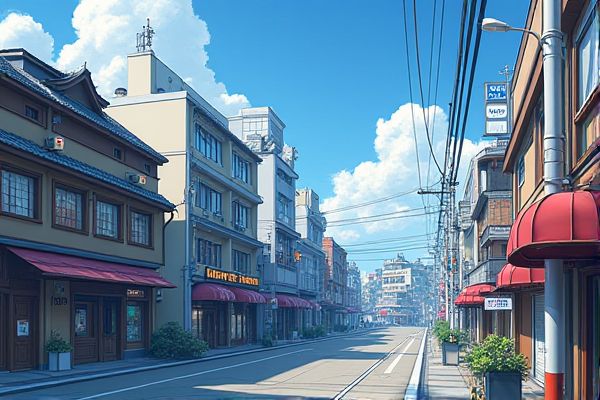
Why moving to Japan: Unique cultural experiences and traditions. High-quality public transportation system. Advanced healthcare facilities. Safe and clean environment. Delicious and diverse cuisine. Strong focus on technology and innovation. Work-life balance differs from Western countries. Efficient education system. Variety of recreational activities. Opportunities for language learning and exchange.
Unique cultural experiences and traditions
Moving to Japan offers a rich cultural experience, including visits to temples and shrines, traditional Japanese tea ceremonies, relaxing in onsens, and participating in unique events like cherry blossom viewing and sumo wrestling matches. All of these activities beautifully blend traditional heritage with modern life. For a more comprehensive guide, be sure to check out the Cultural Guide to Japan, which provides deeper insights into this fascinating country.
High-quality public transportation system
Japan boasts one of the world's most efficient and convenient public transportation systems, praised for being clean, safe, and reliable. With a vast network of trains, subways, monorails, buses, and ferries, it carries over 30 billion passengers annually, ensuring smooth and punctual travel across the country. For a more detailed overview of the various transport options available, you can explore the comprehensive guide on Public Transportation in Japan which offers useful insights into navigating this sophisticated network. Whether you're commuting in bustling cities or traveling between scenic regions, Japan's public transport exemplifies efficiency and reliability, making it an integral part of everyday life.
Advanced healthcare facilities
Moving to Japan offers access to advanced healthcare facilities, characterized by a high number of hospital beds, extensive use of medical technology such as MRI and CT scanners, and high-quality medical services, including specialized departments and a strong emphasis on preventive care and disease prevention.
Safe and clean environment
Moving to Japan offers a safe and clean environment due to the country's strong cultural emphasis on cleanliness, personal responsibility, and group cleaning practices. These values result in immaculately maintained public and private spaces, despite the lack of trash cans and street sweepers. For more information, discover the traditions and practices on Japan Living Guide to understand how these cultural elements contribute to a pristine living experience in Japan.
Delicious and diverse cuisine
Moving to Japan offers the opportunity to experience a delicious and diverse cuisine, characterized by its extraordinary diversity influenced by regional specialties, foreign cuisines, and historical exchanges. This rich culinary landscape includes dishes like ramen, gyoza, tempura, and tonkatsu, which have been adapted to local tastes and ingredients. To explore more about this fascinating topic, visit the Social and Cultural Diversity of Food and Cuisine in Japan for an in-depth look at how these influences shape the Japanese culinary scene.
Strong focus on technology and innovation
Japan is an ideal destination for those interested in technology and innovation due to its robust support for research and development, leading to advancements in fields such as automotive engines, television display technology, robotics, and biomedical research. With a strong educational system and prominent global companies like Sony, Panasonic, and Toyota, Japan has established itself as a leader in these fields. To learn more about Japan's role in science and technology, visit the detailed overview of Science and Technology in Japan. This thriving environment not only attracts global attention but also continues to inspire the next generation of innovators.
Work-life balance differs from Western countries
In Japan, Work-Life Balance is heavily influenced by a strong cultural norm of dedication to the company, leading to long working hours and overtime. This contrasts sharply with practices in Western countries, where work-life balance is more flexible, emphasizing individual growth and mental health support. The cultural emphasis in Japan often leaves workers feeling pressured to prioritize corporate allegiance over personal well-being, whereas initiatives in the West promote a healthier balance between professional responsibilities and personal life. For more insights into these cultural dynamics, visit the article on Work-Life Balance in Japan and the West. Understanding these distinctions can foster better cross-cultural appreciation and improvements in workplace policies globally.
Efficient education system
Japan's education system is highly regarded for its emphasis on holistic development, egalitarianism, and social equality, with students consistently performing well in international assessments like PISA, particularly in science, math, and engineering, and benefiting from a strong commitment to education from both the government and society. The system is characterized by highly qualified teachers, robust parental support, and a well-structured curriculum that focuses on fundamental subjects and high cognitive effort. For more detailed insights into Education in Japan, one can explore the various aspects that contribute to this renowned system.
Variety of recreational activities
Moving to Japan offers a diverse range of recreational activities, including cycling routes with stunning views, skiing and snowboarding in Niseko and Hakuba, hiking trails like the Kumano Kodo and Mt. Fuji, and unique experiences such as kayaking in Okinawa and soaking in natural hot springs (onsens). The country also features theme parks, forest bathing (shinrin-yoku), and traditional activities like sumo watching and geisha performances, ensuring there is something for every interest. For more information, explore the Japan National Tourism Organization website to discover the exciting adventures awaiting in Japan.
Opportunities for language learning and exchange
Moving to Japan offers unparalleled opportunities for language learning and exchange, allowing you to immerse yourself in the language through daily interactions, cultural activities, and structured courses with experienced teachers, thus accelerating your language skills and cultural understanding. For more information, you can explore the EF Education First website, which provides valuable insights into the advantages of learning Japanese in an immersive environment.
